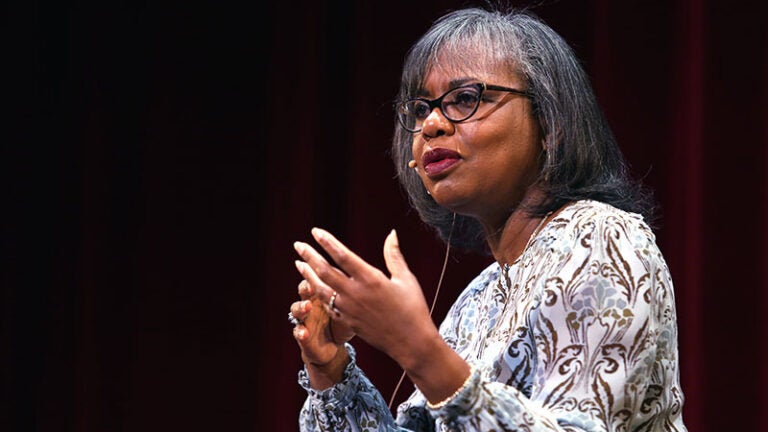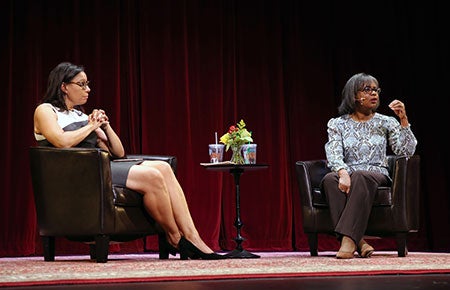
Anita Hill has unanswered questions regarding Kavanaugh
Anita Hill said she has “so many questions” that she would have liked to ask Judge Brett Kavanaugh at the Senate confirmation hearings in September, before his confirmation to the United States Supreme Court. Kavanaugh was accused by Christine Blasey Ford, now a professor of psychology, of assaulting her at a party when they were teenagers.
Twenty-seven years before Blasey Ford’s testimony, Hill, a professor of law, had sat before some of the same members of the Senate Judiciary Committee, describing allegations of sexual harassment that she said she had endured from U.S. Supreme Court nominee Clarence Thomas when she worked with him at the U.S. Department of Education’s Office for Civil Rights and, later, the Equal Employment Opportunity Commission.
Of Kavanaugh, “I would have asked: Have you ever been in a situation where you were imposing yourself because of your physical strength, or because of your power or status upon a woman who was resisting you?” Hill said, speaking on Nov. 8 at a USC Dornsife event in front of an audience of several hundred students, faculty, staff and alumni at USC’s Bovard Auditorium.
“I would have asked: How do you view power? Do you view it as something that can be used as a weapon? Or do you use it as something that should be shared?” said Hill. “That would have told me what kind of justice he was going to be.”
Hill made the comments during an interview with USC Dornsife’s Ange-Marie Hancock Alfaro. The Dean’s Professor of Gender Studies and professor of political science, sociology and gender studies invited Hill to USC as part of a speaker series for a special #MeToo course that Hancock Alfaro is teaching this semester. Students in the course have heard from sexual assault victims who have come forward. Hancock Alfaro’s students are developing recommendations for raising awareness of sexual assault and harassment and the potential policies that could address it.

USC Dornsife Professor Ange-Marie Hancock Alfaro (left) interviews Anita Hill (right) about sexual harassment awareness in the years since Hill testified at the 1991 confirmation hearings for U.S. Supreme Court Justice Clarence Thomas.
Before interviewing Hill, Hancock Alfaro told the audience that Hill’s visit was planned “long before” the accusations against Kavanaugh emerged and before news of assault allegations against a USC gynecologist.
Tale of two nominations
Reporters and experts have drawn several similarities between the Thomas and Kavanaugh hearings and how the Senate Judiciary Committee handled the hearings. Kavanaugh and Thomas both angrily denied the accusations, many senators doubted both women’s stories, and both men were confirmed, despite the allegations. Both women received a mixed outpouring of support and threats. Blasey Ford remains unable to return to teaching because of continued safety concerns, the media has reported.
Hill said that Supreme Court nominee hearings are supposed to focus on whether the nominee has the appropriate character to be a justice for the high court to make decisions that will affect all Americans and recognize that “the purpose of the law is to protect minorities from the tyranny of the majority.”
Innocent until proven guilty?
Hill expressed great disappointment in Sen. Susan Collins (R-Maine), who backed Kavanaugh’s confirmation.
“I think I would have been more accepting if she had said that ‘this is a political decision that I’m going to make,’” Hill said. “I resented her saying that Christine Blasey Ford couldn’t tell who her assailant was. I resented that she told the public that if you didn’t side with Kavanaugh that he deserved to be innocent until proven guilty because that didn’t apply to a confirmation hearing. It had no application there.”
Hill, who is now a social policy, law and women’s studies professor at Brandeis University in Waltham, Massachusetts, has tried to lead a very private life since the 1991 hearings. However, she shared her own analysis of her experience with the Thomas hearings and the aftermath in a 1997 memoir, Speaking Truth to Power. She noted in the book that she is, as a consequence of coming forward, an enduring symbol of harassment.
“To my supporters I represent the courage to come forward and disclose a painful truth — a courage which thousands of others have found since the hearing,” Hill wrote. “To my detractors I represent the debasement of a public forum; at best, a pawn, at worst, a perjurer.”
Biden’s apology
Hill described in the book how then-Sen. Joseph Biden (D-Delaware) had managed the hearings, allowing senators to interview her and then following with a response by Thomas in which he angrily complained of racism, calling the situation a “high-tech lynching.”
In recent years, Biden said that he owed Hill an apology and that he wished he could have done more. Hill told the audience that she still has not received one directly from him.
“I’m in favor of all of the work he’s done” with sexual assault prevention, she said. “Does that mean that I think what happened in 1991 doesn’t matter? No.”
“I wish that he had taken more ownership,” Hill said, adding that he could have called more witnesses and pushed back on colleagues who didn’t want to. She joked, however, that the “statute of limitations on the apology has run out.”